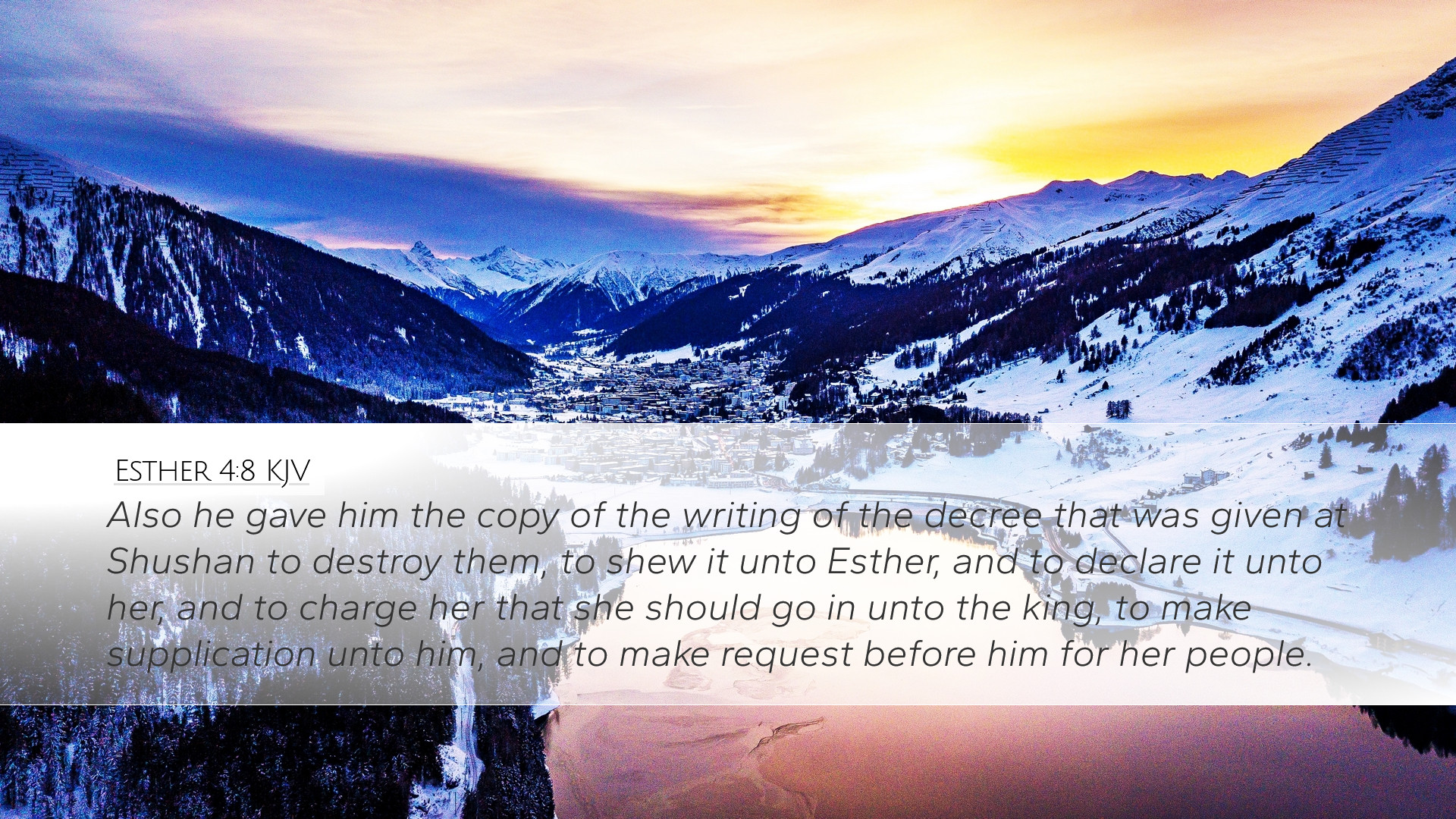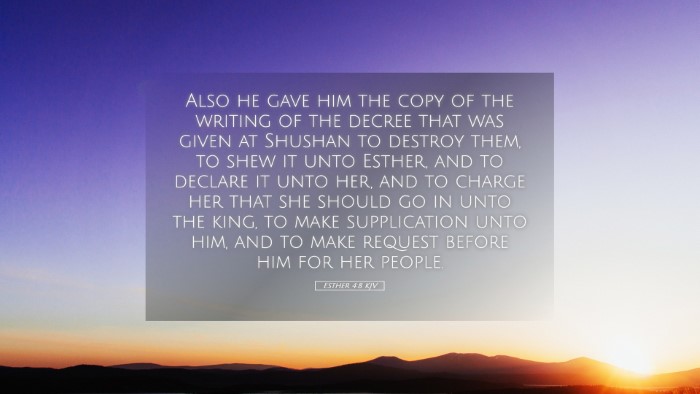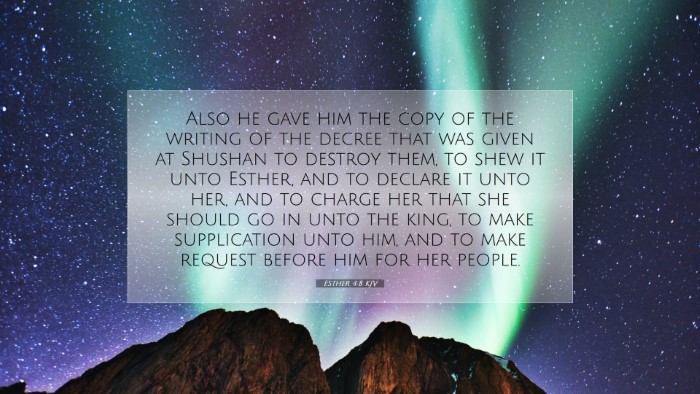Old Testament
Genesis Exodus Leviticus Numbers Deuteronomy Joshua Judges Ruth 1 Samuel 2 Samuel 1 Kings 2 Kings 1 Chronicles 2 Chronicles Ezra Nehemiah Esther Job Psalms Proverbs Ecclesiastes Song of Solomon Isaiah Jeremiah Lamentations Ezekiel Daniel Hosea Joel Amos Obadiah Jonah Micah Nahum Habakkuk Zephaniah Haggai Zechariah MalachiEsther 4:8
Esther 4:8 KJV
Also he gave him the copy of the writing of the decree that was given at Shushan to destroy them, to shew it unto Esther, and to declare it unto her, and to charge her that she should go in unto the king, to make supplication unto him, and to make request before him for her people.
Esther 4:8 Bible Commentary
Commentary on Esther 4:8
Esther 4:8 states: "He also gave him a copy of the writing of the decree that was given at Shushan to destroy them, to show it unto Esther, and to declare it unto her, and to charge her that she should go in unto the king, to make supplication unto him, and to make request before him for her people."
Contextual Background
The Book of Esther unfolds a narrative situated in the Persian Empire, where the Jewish people are faced with an existential threat. The decree issued by Haman for the destruction of the Jews prompts Mordecai to seek help from his relative, Esther, who has risen to the position of queen. This passage is pivotal as it calls for Esther to intercede on behalf of her people.
Exegetical Insights
This verse captures the moment when Mordecai implores Esther to take action. It emphasizes the urgency and the weight of responsibility placed upon her shoulders. The sending of the decree signifies both a tangible representation of the peril facing the Jewish people and a catalyst for Esther's crucial decision.
Mordecai's Initiative
According to Matthew Henry, the actions of Mordecai reflect a blend of wisdom and a deep concern for his community. He does not merely express his fears but instead seeks a proactive approach to remedy the situation. His decision to send a copy of the decree to Esther serves multiple purposes:
- Awareness: By providing Esther with the decree, Mordecai ensures she fully understands the gravity of the situation.
- Motivation: The tangible evidence of the threat may stir in Esther a sense of urgency to act.
- Direct Appeal: Mordecai's request for Esther to approach the king signifies the monumental role she plays as queen.
Esther's Position
Esther, while in a seemingly secure position as queen, is faced with a critical decision that weighs heavily on her conscience. Albert Barnes articulates that the role of a leader often comes with daunting challenges, and Esther's choice to intercede for her people represents a profound act of courage and faith. This moment might be viewed in light of the paradox of her royal status juxtaposed against the dire reality of her heritage.
Divine Providence
Mordecai's appeal to Esther could also be viewed through the lens of divine providence, a theme prevalent in Esther. Adam Clarke suggests that Esther's rise to queen is not mere happenstance but may be viewed as part of God's sovereign plan for deliverance. The Jewish audience recognizing God's unseen hand in their struggles is paramount in understanding the deeper theological implications of the story.
Theological Themes
Several themes arise from this passage that are essential for reflection among pastors and scholars:
- Courage and Obedience: Esther’s call to action mirrors the Christian call to courageously face opposition and act in faith.
- Intercession: The act of supplication that Esther is called to engage in resonates deeply within Christian theology, where interceding for others is seen as a noble and necessary practice.
- Identity and Heritage: Esther’s Jewish identity has implications not only for her personal faith but also for her role within the larger narrative of God's covenant people.
Implications for Ministry
This passage offers rich ground for reflection within pastoral ministry:
- Empowerment of Individuals: Like Mordecai, church leaders can empower members to take significant actions on behalf of others, encouraging them to recognize their roles in God’s purposes.
- Courage in the Face of Adversity: Pastors can use Esther as an exemplar of courage to inspire congregations facing social, spiritual, or personal challenges.
- Encouraging Intercession: Emphasizing a culture of prayer and intercession mirrors Esther’s actions and can lead to a deeper connection within the church community.
Conclusion
Esther 4:8 encapsulates a pivotal moment of decision and divine orchestration. The narrative not only serves to highlight key theological themes such as courage, intercession, and identity but also promotes reflection on how God’s providence operates amid human agency. For pastors, students, theologians, and scholars, this verse beckons a call to engage with God’s unfolding purposes in our lives and the lives of those we serve.


